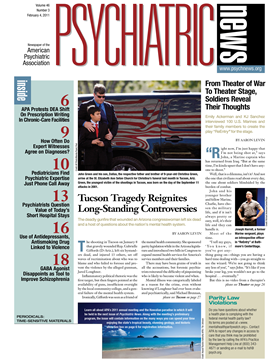APA and a congressional ally are urging the Obama administration to require the Drug Enforcement Administration (DEA) to adjust a new initiative that is negatively impacting the care of patients in long-term-care facilities.
The problems stem from a 2010 DEA initiative to enforce a requirement of the Controlled Substances Act that physicians treating patients in nursing homes, hospices, and other long-term-care settings provide a written prescription directly to a pharmacist when ordering controlled substances. The prescription requirement, which was previously unenforced, bars the earlier practice of many clinicians of verbally authorizing long-term-care facility staff members to administer needed medications and then faxing a written prescription to the pharmacy within 24 hours.
Enforcing a ban on temporary verbal authorizations has resulted in many patients' experiencing acute pain or psychotic episodes outside of pharmacies' operating hours and going without needed care, according to APA and others concerned with the treatment of chronically ill patients.
“This [enforcement initiative] is both frustrating to our members and a barrier to prompt, appropriate, and medically needed care,” wrote James H. Scully Jr., M.D., medical director of APA, in a letter to Sen. Herb Kohl (D-Wis.), who in turn raised APA's concerns with the Obama administration.
An additional problem caused by the enforcement initiative is that it may open clinicians to legal liabilities under laws requiring physicians to provide prompt care for patients in distress, according to Cheryl Phillips, M.D., president of the American Geriatrics Society.
“The fact is that physicians are very aware of the liability risks that accompany poor pain control,” said Phillips during congressional testimony on the issue in March 2010. “When they realize that there are such significant challenges to adequately manage pain in the nursing home, the easiest option for physicians is to merely opt out of nursing home practice.”
After requests last year by APA and other clinician advocates, the DEA made small changes to its policy, such as allowing nurses to physically transmit written prescriptions to a pharmacy. However, the DEA did not address the underlying obstacles it erected to prompt medical care, Scully wrote.
To spur greater changes to the DEA initiative, Kohl has temporarily blocked a Senate vote on the confirmation of President Obama's nominee for administrator of the DEA, Michele Leonhart, according to a Senate staffer. The hold was not made at the request of APA but selected by the senator as a high-profile way to underscore the seriousness of this issue.
The Obama administration and congressional staff are holding ongoing discussions on ways to remove the obstacles to care that the initiative created, including possibly allowing nurses to phone in medication orders as directed by a physician. But allowing that might require Congress to pass new legislation, which Kohl is drafting, according to the Senate staffer.
APA supports the nurse-involvement provision. “We believe that this would allow timely medical intervention while ensuring that appropriate controls are maintained,” Scully wrote.
